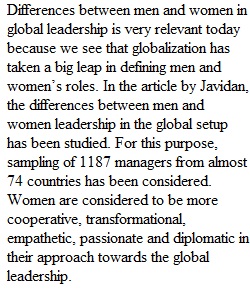


Q Engagement - Discussion Questions 3 All Sections 33 unread replies.1111 replies. Due: Tuesday Module 3 Module 3 Reading Assignment 3 See Lecture Notes: Seminar Lecture 3 Leadership and Gender: Select any ONE from the three below. Briefly connect your responses to this week's Lecture. van Engen, van der Leeden, & Willemsen’s (2001) article/study, raises a few questions about generally assumed stereotypical differences in male-female leadership styles. What is the importance of “context” is understanding, appreciating, and debunking stereotypical female leadership styles? Billing & Alvesson (2000) raise four critical problems with the idea of feminine leadership. Identify and briefly describe these four problems within the context of your current organizational thinking and practices. Javidan, Bullough, & Dibble’s (2016) article/study, point to several significant differences between men and women in global leadership efficacies. What are those differences and how can they contribute to our understanding of what it means to lead effectively in a globalized environment? Leadership and Diversity. Select any ONE from the two below. Briefly connect your responses to this week's Lecture. Liu and Baker (2016) raise the problem of existing leadership theories that assume leadership to be race-neutral and at the same time promotes ‘whiteness’ as the norm and exemplar of leadership. How is ‘whiteness’ implicated in discourses of leadership in the media, and what are the implications of their study for our interest in leadership and diversity? Patrick and Kumar (2012) examine the potential barriers to workplace diversity and suggests strategies to enhance workplace diversity and inclusiveness. Identify the barriers and enhancing strategies. Does any of this barriers ‘show up’ in your organization? What is being done about that in your organization? Post your answers to the Reply area. This is the first part of your submission, click Next to access the second part.
View Related Questions